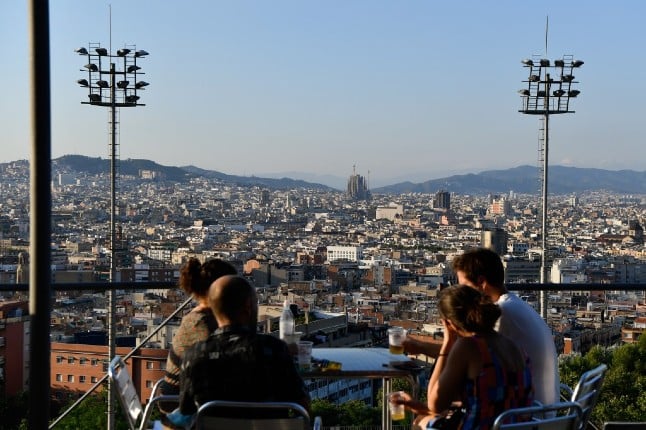NAVARRA
Two Spanish regions impose new Covid restrictions
Two northern Spanish regions bordering France, Catalonia and Navarra, on Sunday announced new coronavirus restrictions on public life to try to tame a rise in Covid-19 infections.
Published: 11 October 2020 16:06 CEST

People sit at a terrace bar overlooking the Sagrada Familia in Barcelona on July 25, 2020. Photo: Pau Barrena/AFP
In Navarra, which is home to around 650,000 people, gatherings as of Tuesday will be limited to six people, bars and restaurants must close at 10 pm and their capacity will be limited to 30 percent, regional leader Maria
Chivite said.
Capacity at cinemas, theatres and libraries will reduced to 30 percent while supermarkets will be limited to 40 percent, she added.
“We are at a critical moment, when we need to redirect the situation. We still have time. We don't want to go to a tougher scenario but that possibility exists,” Chivite told a news conference.
Navarra recorded 463 new Covid-19 cases on Saturday, the highest daily figure since the start of the pandemic.
In the northeastern region of Catalonia, which is home to around 7.5 million people, regional public health secretary Josep Maria Argimon urged companies to encourage their employees to work from home for the next 15 days.
He also asked universities to move their classes online during the next 15 days to reduce “social interactions”. “We will have to make sacrifices,” he said in an interview with RAC1 radio.
“Without taking measures, we could reach the situation in Madrid in two or three weeks,” he added.
The Spanish capital is currently one of Europe's Covid-19 hotspots. The infection rate in the region of Madrid currently stands at 564 cases per 100,000 people, compared with just 257 in the rest of Spain, itself the highest in the European Union.
Spain's central government on Friday declared a state of emergency in the Madrid region to enforce a partial lockdown in and around the Spanish capital.
Url copied to clipboard!


 Please whitelist us to continue reading.
Please whitelist us to continue reading.
Member comments